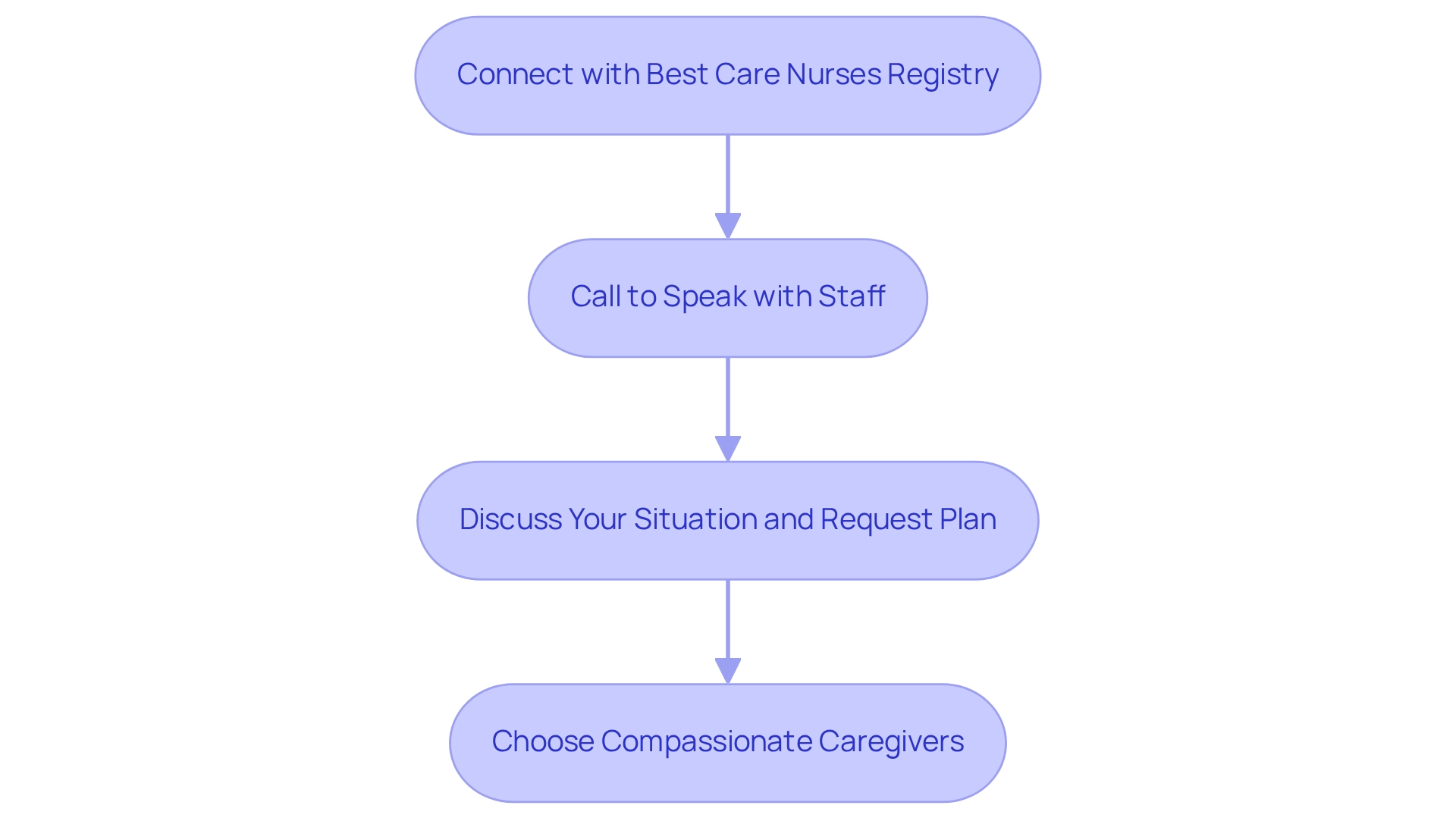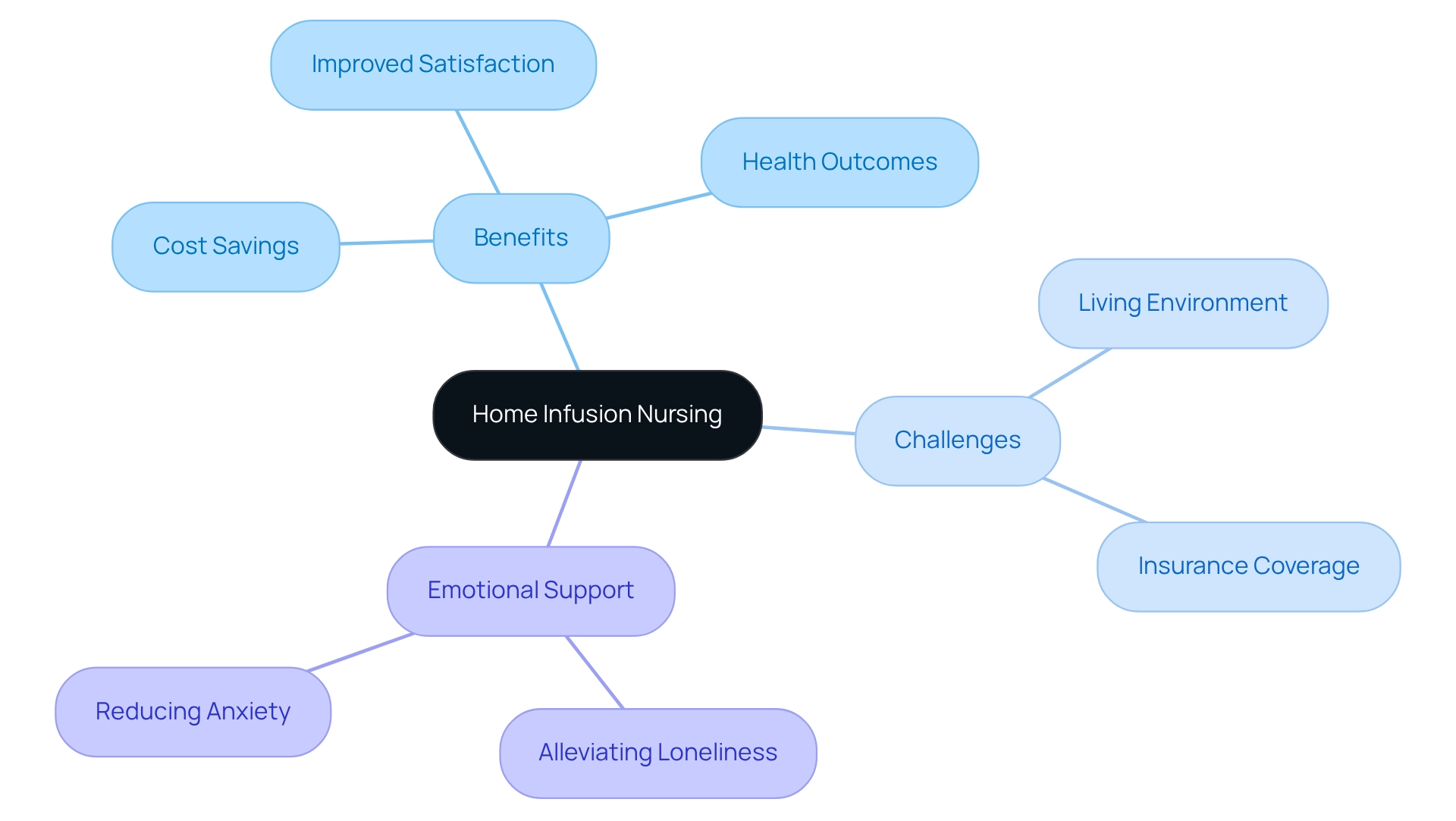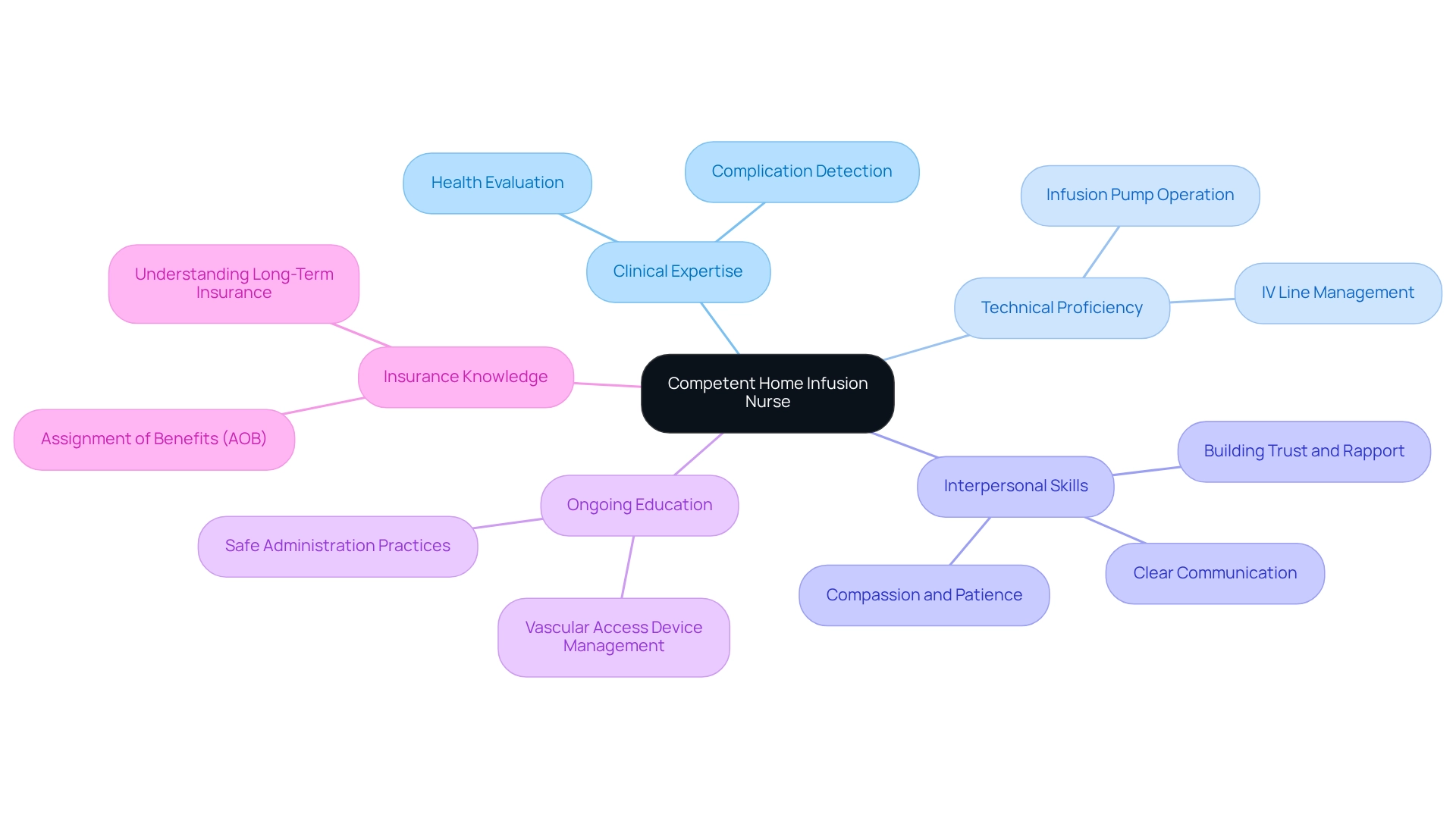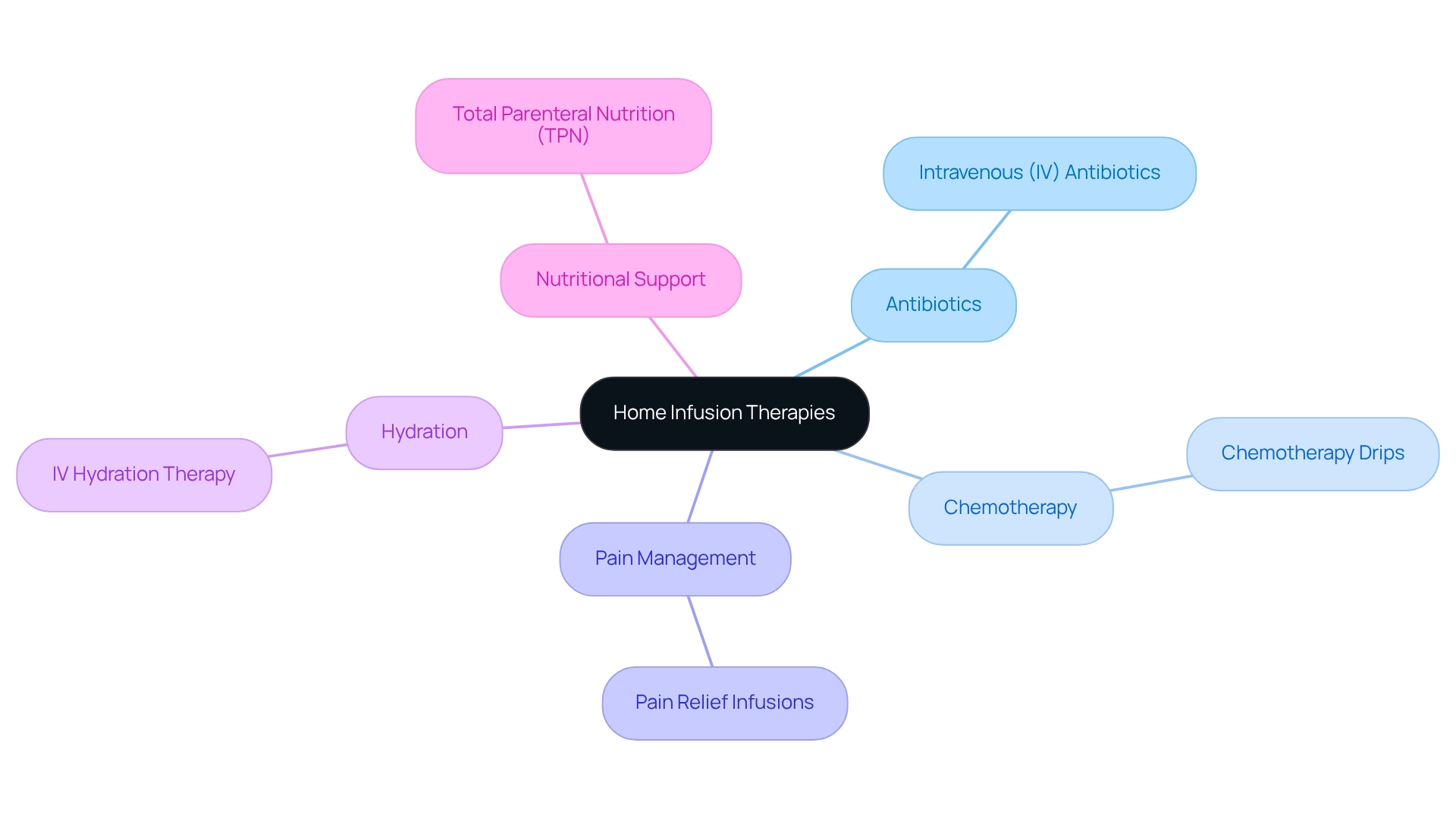Overview
Home infusion nurses are essential to patient care, providing intravenous medications and therapies in the comfort of home. They ensure that patients receive the necessary medical treatments while preserving their independence and comfort. This nurturing approach not only enhances patients’ quality of life but also significantly improves their health outcomes.
Their responsibilities are diverse and vital. From administering medications to monitoring for adverse reactions, home infusion nurses work diligently to safeguard their patients’ well-being. In addition, they collaborate closely with other healthcare providers, creating a supportive network that prioritizes patient care.
Imagine the peace of mind that comes from knowing a skilled nurse is there to support you or your loved one. These professionals not only deliver care but also offer companionship and reassurance during challenging times. Your comfort is their priority, and they are here to help you navigate your health journey.
If you or someone you know could benefit from home infusion services, we encourage you to reach out. Together, we can ensure that you receive the compassionate care you deserve in the place you feel most at ease.
Introduction
In the evolving landscape of healthcare, home infusion nursing has become a vital part of patient-centered care, allowing individuals to receive essential medical treatments in the comfort of their own homes. This specialized field not only enhances the quality of life for patients, especially those with chronic conditions, but also eases the burdens associated with frequent hospital visits. Home infusion nurses are at the forefront of this shift, equipped with the skills and expertise to administer complex therapies while fostering a supportive environment.
As the demand for home health care continues to rise, it’s important to understand the role of these dedicated professionals. They are here to provide compassionate and effective care solutions, ensuring that your loved ones receive the best support possible. If you or a family member are considering home infusion services, know that we’re here for you, ready to guide you through every step of the process.
Define Home Infusion Nurse: Role and Responsibilities
A home infusion nurse is a registered nurse (RN) who provides care in a residential setting by delivering intravenous (IV) medications and therapies to individuals. Their primary duties include:
- Evaluating medical needs
- Preparing and administering medications
- Monitoring for adverse reactions
- Educating individuals and their families about the administration process
Moreover, the role of the home infusion nurse offering at-home therapies is vital in coordinating support with other healthcare providers, ensuring that comprehensive treatment strategies are executed effectively. This role is particularly significant for individuals requiring continuous medical attention who prefer the comfort and familiarity of their own homes. By offering specialized assistance, at-home nurses greatly enhance individuals’ quality of life and independence. They ensure safety and comfort, both of which are essential for improving overall health outcomes. Current statistics indicate that infusion nursing not only improves health outcomes but also fosters a collaborative approach to healthcare, which is critical for effective treatment. For instance, Huffman oversees approximately 35 Cleveland Clinic nurses under the organization’s health services umbrella, highlighting the scale and importance of this nursing specialty.
The advocacy role of these nurses necessitates strong communication skills and the ability to collaborate closely with other healthcare providers. As Nurse Alice Benjamin points out, monitoring urine output is crucial in identifying Acute Kidney Injury (AKI), underscoring the importance of attentiveness in healthcare. Additionally, case studies, such as those analyzing total parenteral nutrition (TPN) in critical settings, illustrate the significant impact infusion nursing can have on recovery. At Best Care Nurses Registry, we understand that the combination of CNA and HHA caregivers is essential for providing comprehensive home health assistance. These caregivers assist with daily living activities and maintain close contact with individuals, ensuring families are kept informed about their loved ones’ conditions. This collaborative approach not only addresses safety and emotional support for seniors but also enhances their overall quality of life.
To connect with Best Care Nurses Registry, follow these three straightforward steps:
- Call to speak with our friendly staff to discuss your needs and answer any questions you may have.
- We’ll discuss your situation with you or your loved one and request a plan from your doctor that fully addresses your needs.
- We will refer compassionate caregivers for you to choose to work with.
Overall, home infusion nurses are integral to the healthcare continuum, ensuring that patients receive the best possible care in their own homes. Home health assistance is not only effective but also a cost-efficient solution for families seeking compassionate support.

Contextualize Home Infusion Nursing: Importance in Patient Care
Home infusion nursing has gained prominence as the healthcare sector increasingly embraces patient-centered care. With advancements in medical technology, treatments that once required hospitalization can now be safely administered in the comfort of your home. This transition not only decreases healthcare expenses but also significantly improves your satisfaction and comfort. Home infusion nurses play a crucial role in this evolution, offering specialized support that allows you to maintain your independence while receiving necessary medical treatments.
For older individuals and those with long-term conditions, the ability to receive care at home is especially beneficial. It alleviates the stress and risks associated with frequent hospital visits, allowing for a more relaxed and familiar environment during treatment. Moreover, at-home therapy can lead to better health outcomes, as individuals are more inclined to follow their treatment plans when they feel at ease and supported in their own surroundings. The emotional support provided by caregivers can also ease feelings of loneliness and anxiety, contributing to your overall well-being.
Despite the advantages, challenges such as the need for suitable living environments and complex insurance coverage can arise. Many insurance policies, including Medicare, may offer partial or complete coverage for therapy administered at home, depending on your diagnosis and recommended treatment. As noted by Best Care Nurses Registry, “It’s recommended to consult with your domestic IV service provider for detailed verification.” With adequate planning and assistance, a home infusion nurse can make at-home therapy a viable option for many patients, ensuring you receive the support you need without the burdens of hospitalization. As the demand for residential health care continues to grow, the role of home nursing will remain vital in providing high-quality, patient-centered care.

Outline Skills and Qualifications: What Makes a Competent Home Infusion Nurse
A competent home infusion nurse embodies a blend of clinical expertise, technical proficiency, and strong interpersonal skills. With a valid RN license and specialized training in infusion therapy, these nurses are well-equipped to manage IV lines and infusion pumps effectively. Their ability to evaluate individuals’ health is essential, allowing them to observe conditions and swiftly detect possible complications.
Clear communication is a cornerstone of this role. Nurses must effectively inform individuals and their families about treatment procedures while addressing any concerns that arise. Compassion and patience are crucial qualities that build trust and rapport, greatly enhancing the experience for those receiving treatment.
In addition to these fundamental skills, a commitment to continuous learning is vital. Ongoing education courses in IV therapy cover essential topics such as vascular access device management and safe administration practices, ensuring nurses remain informed and proficient. This dedication to professional growth not only enhances high-standard patient support but also aligns with the increasing need for home administration services, as highlighted by the estimated 3.2 million individuals receiving home therapy in 2020. These courses are essential for maintaining the skills required in fields involving comprehensive infusion procedures, such as chemotherapy and immunotherapy.
Furthermore, Best Care Nurses Registry offers adaptable respite assistance services, enabling caregivers to provide support tailored to specific needs, whether for just a few hours a day or continuously. This flexibility is crucial for seniors and their families, accommodating various schedules and support requirements. Understanding long-term insurance is also important, as it can facilitate access to these services without immediate out-of-pocket costs, depending on policy conditions. Specifically, the Assignment of Benefits (AOB) process allows policyholders to direct their insurance carriers to pay Best Care directly for services rendered, streamlining the payment process. While private duty providers can assist with activities of daily living, it is important to note that Medicare typically covers only limited services, emphasizing skilled visits rather than extensive personal support. Overall, the combination of these skills and qualifications positions home infusion nurses as essential members of interdisciplinary healthcare teams. They work collaboratively with doctors, pharmacists, and other specialists, enhancing care through teamwork and shared knowledge. We’re here for you, ensuring that your comfort and well-being are our top priorities.

Explore Infusion Therapies: Types and Applications in Home Care
Home delivery therapies encompass a range of treatments, including antibiotics, chemotherapy, pain management, hydration, and nutritional support. For instance, individuals battling infections may receive intravenous (IV) antibiotics, while those undergoing cancer treatment often require chemotherapy drips. Nutritional support, particularly total parenteral nutrition (TPN), is crucial for individuals unable to consume food orally. Each therapy is tailored to meet the specific needs of the individual, with home infusion nurses playing a vital role in delivering these treatments safely and efficiently. By providing these therapies in the comfort of home, home infusion nurses from Best Care Nurses Registry help individuals avoid the discomfort and inconvenience associated with hospital stays, significantly enhancing their overall quality of life. This compassionate approach not only addresses the medical needs of patients but also offers emotional relief for families, allowing them to reconnect and focus on their loved ones without the added stress of caregiving.
Best Care Nurses Registry ensures that all caregivers are thoroughly screened and dedicated to excellence, providing peace of mind for families. Furthermore, obtaining a personalized treatment plan from your physician is a crucial step in ensuring that your loved one receives the highest quality care, particularly as the role of the home infusion nurse becomes increasingly important for individuals with chronic conditions who require ongoing medical support in their homes. In fact, the U.S. residential therapy market was valued at USD 19.65 billion in 2024, reflecting its growing significance.
However, the market faces challenges, including a complicated reimbursement framework and recent cuts in reimbursement rates, which may limit adoption. As Jignesh Rawal notes, navigating this changing environment is essential for entities involved in at-home therapies. With around 75 million people over the age of 60 suffering from chronic diseases in India alone, the demand for effective home infusion therapies is more pressing than ever.
Are you ready to explore the support available for your loved ones? Call now to get started with Best Care Nurses Registry at (888) 203-2529 and discover the variety of services we provide!

Conclusion
Home infusion nursing is a vital aspect of modern healthcare, bringing essential treatments right to the comfort of patients’ homes. This specialized field not only uplifts the quality of life for those with chronic conditions but also alleviates the stress and logistical hurdles tied to regular hospital visits. Home infusion nurses are trained to administer complex therapies, ensuring safety and comfort, which significantly enhances patient outcomes.
The value of home infusion nursing shines through its commitment to delivering patient-centered care that promotes independence and emotional well-being. By enabling patients to receive crucial medical treatments in familiar environments, home infusion services lead to improved adherence to treatment plans and greater overall satisfaction. While challenges like navigating insurance and ensuring appropriate home settings may arise, the advantages of this care model are clear and compelling.
Ultimately, the role of home infusion nurses is indispensable in the transforming landscape of healthcare. Their combination of clinical expertise, technical skills, and compassionate care not only meets the medical needs of patients but also nurtures their emotional and psychological health. As the demand for home health care continues to rise, these dedicated professionals will play a crucial role in providing high-quality, effective care solutions tailored to the unique needs of patients and their families. Embracing home infusion therapy can lead to a healthier, more comfortable future for those requiring ongoing medical support. Remember, we’re here for you, and your comfort is our priority.
Frequently Asked Questions
What is a home infusion nurse?
A home infusion nurse is a registered nurse (RN) who provides care in a residential setting by delivering intravenous (IV) medications and therapies to individuals.
What are the primary duties of a home infusion nurse?
The primary duties include evaluating medical needs, preparing and administering medications, monitoring for adverse reactions, and educating individuals and their families about the administration process.
Why is the role of a home infusion nurse important?
The role is vital for coordinating support with other healthcare providers, ensuring comprehensive treatment strategies are executed effectively, especially for individuals requiring continuous medical attention in the comfort of their own homes.
How do home infusion nurses enhance the quality of life for individuals?
They provide specialized assistance that improves safety and comfort, which are essential for better overall health outcomes and increased independence for patients.
What skills are necessary for home infusion nurses?
Strong communication skills and the ability to collaborate closely with other healthcare providers are essential for effectively advocating for patients.
How does infusion nursing impact health outcomes?
Infusion nursing improves health outcomes and fosters a collaborative approach to healthcare, which is critical for effective treatment.
What steps should one follow to connect with Best Care Nurses Registry?
To connect, one should: 1) Call to discuss needs with staff, 2) Discuss the situation with the staff and provide a plan from a doctor, and 3) Choose from compassionate caregivers referred by the registry.
What is the significance of monitoring urine output in home infusion nursing?
Monitoring urine output is crucial for identifying Acute Kidney Injury (AKI), highlighting the importance of attentiveness in healthcare.
How does Best Care Nurses Registry support home health assistance?
They provide a combination of CNA and HHA caregivers who assist with daily living activities and maintain close contact with individuals, ensuring families are informed about their loved ones’ conditions.











